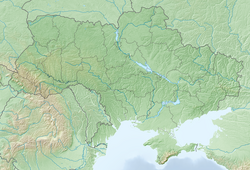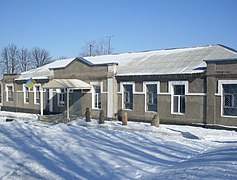Volnovakha
Volnovakha (Ukrainian: Волнова́ха, IPA: ; Russian: Волнова́ха; Greek: Βολνοβάχα) is a city in Donetsk Oblast, eastern Ukraine.
It serves as the administrative center of Volnovakha Raion within the oblast. As of January 2022, it had a population of 21,166.
Volnovakha Волноваха | |
|---|---|
 Palace of Culture | |
| Coordinates: 47°36′08″N 37°29′31″E / 47.60222°N 37.49194°E | |
| Country | |
| Oblast | Donetsk Oblast |
| Raion | Volnovakha Raion |
| Hromada | Volnovakha urban hromada |
| Founded | 1881 |
| City status | 1938 |
| Area | |
| • Total | 21 km2 (8 sq mi) |
| Elevation | 271 m (889 ft) |
| Population (2022) | |
| • Total | 21,166 |
| Website | www.volnovaha.net (archive) |
The train station is a railway hub. It serves the only onshore rail line between Donetsk and Russia to the north-east and east, and Zaporizhzhia Oblast and Crimea to the west and south-west, and the only rail line south to Mariupol.
In February and March 2022, during the Russian invasion of Ukraine, many of its buildings were damaged or destroyed. The governor of the region, Pavlo Kyrylenko, said that 90% of the city's critical infrastructure was destroyed.
History
Pre-founding
The site of modern Volnovakha was inhabited during the Bronze Age, as is evidenced by archaeological excavations in the northeast part of the city. A burial in a stone tomb has been uncovered, and stone babas indicate the presence of nomadic peoples in the area.
Founding and early history
Volnovakha was founded as a railway station in the Russian Empire in 1881. Its name is derived from that of the Mokra Volnovakha river, which originates nearby. During the first two decades of the station's existence, it was a minor stop on the railway from Olenivka to Mariupol. It transported mainly bread and agricultural crops. As the Port of Mariupol was expanded and factories were built in Mariupol, cargo transit through Volnovakha increased significantly. This forced the administration of the railway to introduce optimizations, establishing a telegraph line in 1891 and introducing a second track in 1900. However, the actual civilian settlement around the station grew slowly. By the beginning of the 1900s, there were only 45 houses and 250 people living in Volnovakha.
The station became a railway hub in 1904, contributing to its development and that of the settlement growing around it. The new rail went through Oleksandrivsk (today Zaporizhzhia City) and Polohy to Volnovakha. A school for children was opened in 1905, and the number of workers at the station increased to 400 by 1908.
During the Russian Civil War, Volnovakha was the scene of fighting multiple times due to its strategic significance as a rail hub. On 18–20 April 1918, it was the site of battles between the Bolsheviks and the Central Powers during the latter's 1918 invasion of Ukraine. The Central Powers took over the station and village on 22 April. Volnovakha served as a base for the German 15th Division and the Austro-Hungarian 59th Division starting in June 1918. It was captured by soldiers loyal to the anti-communist White Movement in early December 1918, and changed hands several more times. It was the location of battles in 1919 and 1920 during the Ukrainian War of Independence. Eventually, the victorious Bolsheviks captured Volnovakha along with the rest of Ukraine and established the communist Soviet Union on much of the territory of the former Russian Empire.
In the Soviet Union

Volnovakha received urban-type settlement status in 1923, and was assigned to Mariupol Okruha. In January 1923, Volnovakha had a population of 872 people. Development of the railway station continued throughout the 1920s and 1930s. Volnovakha received city status in 1938. In 1939, the city's population was 15,261 people.
During World War II, Volnovakha was occupied by Nazi Germany from October 11, 1941 to September 10, 1943. According to official Soviet sources, during the occupation the Nazis murdered about one hundred Soviet citizens, including thirty-five communists and the head of the collective farm. 1,000 Soviet citizens were kidnapped to Germany for forced labor. Soviet sources also record heavy partisan resistance to the Nazi occupation, and say that the Soviet aviation repeatedly bombed Nazi ammunition warehouses and other military infrastructure in the occupied city.
There was significant fighting in the area around Volnovakha during August and September 1943. Eventually, Volnovakha was liberated by the Red Army on September 10, 1943, after fierce fighting on the Kalmius river. The Nazis destroyed much of the city behind them during their retreat. Several units were given honorary titles after the battle in the city. The city's infrastructure was slowly rebuilt in the post-war period.
In 1977, a museum of local history was founded in Volnovakha. It contains many archaeological objects, and exhibits on local nature, the ancient history of the area, and the history of the development of Orthodox Christianity in the area.
Russo-Ukrainian War

During the war in Donbas, pro-Russian separatists captured the city in May 2014. The Ukrainian military recaptured it in July. On 13 January 2015, 12 civilians were killed and 18 injured, after an attack on a passenger bus at a checkpoint in Buhas, a town north-east of Volnovakha. A monument to those killed in the attack was unveiled on 13 January 2017.
In May 2015, a community of the Ukrainian Orthodox Church – Kyiv Patriarchate was registered in Volnovakha. They said that this had not been possible before, due to fear of the Viktor Yanukovych regime that had been recently deposed in the 2014 Revolution of Dignity. In October 2015, a monument to Vladimir Lenin was demolished in Volnovakha as part of decommunization in Ukraine.
In 2018, a new church was opened in the city.
During the 2022 Russian invasion of Ukraine, Russian forces fought for control of the city and engaged in indiscriminate bombing of Volnovakha, shelling civilian areas. The terror bombing of the cities violated international law and echoed tactics Russia had previously used on civilian targets in Syria. Volnovakha was reported to be on the verge of humanitarian crisis on February 28, and almost destroyed by March 1, with around 90% of its buildings either damaged or destroyed. Surviving residents were cut off from food, water, and electricity. Following the assault, bodies lay uncollected in the streets.
On 11 March, Russia claimed that forces of the Donetsk People's Republic had captured Volnovakha. On 12 March, Euronews reported that much of the town was in ruins after the fighting. On 1 April, Pavlo Kyrylenko, the governor of Donetsk Oblast, said that 90% of its critical infrastructure was destroyed.
On 27 October 2023, Ukrainian prosecutors said that nine members of a Ukrainian family in occupied Volnovakha were murdered by Russian soldiers in their sleep. A few days prior, the family had refused to vacate their house to allow the soldiers to reside there.
Economy

Transport
Volnovakha's main industry is railway transportation. Volnovakha is a rail hub, serving as the only onshore rail line between Donetsk and Russia to the north-east and east, and Zaporizhzhia Oblast and Crimea to the west and south-west. It has the only rail line south to Mariupol.
Other industries
Volnovakha also has a metalworking industry and a building materials industry, which help serve the rail industry.
Demographics
|
|
The town had 24,647 inhabitants in 2001. The town had a large Ukrainian Greek population. 52.9% of the population are ethnic Ukrainians, 24.2% are Russians, 20% are Greeks and 0.7% are Belarusians.
Geography
Climate
| Climate data for Volnovakha (1981–2010) | |||||||||||||
|---|---|---|---|---|---|---|---|---|---|---|---|---|---|
| Month | Jan | Feb | Mar | Apr | May | Jun | Jul | Aug | Sep | Oct | Nov | Dec | Year |
| Mean daily maximum °C (°F) | −1.2 (29.8) | −0.6 (30.9) | 5.3 (41.5) | 14.5 (58.1) | 21.1 (70.0) | 25.2 (77.4) | 27.8 (82.0) | 27.3 (81.1) | 21.1 (70.0) | 13.4 (56.1) | 4.9 (40.8) | −0.1 (31.8) | 13.2 (55.8) |
| Daily mean °C (°F) | −4.0 (24.8) | −4.0 (24.8) | 1.1 (34.0) | 9.1 (48.4) | 15.4 (59.7) | 19.5 (67.1) | 21.9 (71.4) | 21.3 (70.3) | 16.4 (61.5) | 8.6 (47.5) | 1.6 (34.9) | −2.9 (26.8) | 8.6 (47.5) |
| Mean daily minimum °C (°F) | −6.5 (20.3) | −6.8 (19.8) | −2.1 (28.2) | 4.7 (40.5) | 10.2 (50.4) | 14.5 (58.1) | 16.6 (61.9) | 16.0 (60.8) | 10.5 (50.9) | 4.8 (40.6) | −1.0 (30.2) | −5.3 (22.5) | 4.6 (40.3) |
| Average precipitation mm (inches) | 52.2 (2.06) | 44.0 (1.73) | 49.0 (1.93) | 45.0 (1.77) | 52.1 (2.05) | 65.4 (2.57) | 55.0 (2.17) | 45.8 (1.80) | 42.9 (1.69) | 35.4 (1.39) | 49.8 (1.96) | 53.8 (2.12) | 590.4 (23.24) |
| Average precipitation days (≥ 1.0 mm) | 9.9 | 7.7 | 8.8 | 7.2 | 7.3 | 8.2 | 6.6 | 4.6 | 5.4 | 5.9 | 8.1 | 9.8 | 89.5 |
| Average relative humidity (%) | 88.4 | 85.4 | 79.3 | 66.3 | 60.9 | 63.6 | 61.1 | 57.9 | 65.7 | 75.6 | 87.4 | 89.7 | 73.4 |
| Source: World Meteorological Organization | |||||||||||||
Gallery
- Local history museum
- Vasily Chapayev monument
- Train station
Notable people
- Illia Ponomarenko (born 1992), Ukrainian journalist
- Serhiy Bolbat (born 1993), Ukrainian soccer player
References
External links
 Media related to Volnovakha at Wiki Commons
Media related to Volnovakha at Wiki Commons
This article uses material from the Wikipedia English article Volnovakha, which is released under the Creative Commons Attribution-ShareAlike 3.0 license ("CC BY-SA 3.0"); additional terms may apply (view authors). Content is available under CC BY-SA 4.0 unless otherwise noted. Images, videos and audio are available under their respective licenses.
®Wikipedia is a registered trademark of the Wiki Foundation, Inc. Wiki English (DUHOCTRUNGQUOC.VN) is an independent company and has no affiliation with Wiki Foundation.






